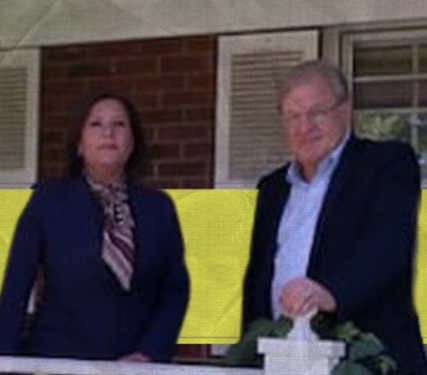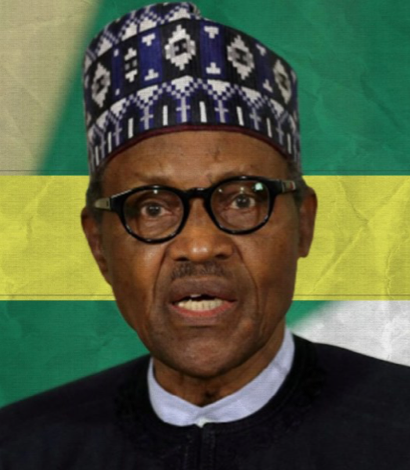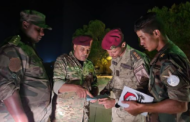Jun. 17, LNA chief Haftar meets Egypt intelligence head Kamel in Benghazi, aiming to enhance bilateral cooperation.
Jun. 20, PM Dbaiba attends ceremony in Buerat, announces Sirte-Misurata coastal road reopened.
Nigeria Pres. Buhari meets new UNOWAS Spec. Rep. Mahamat Saleh Annadif, says instability in Libya, Sahel may help increase Boko Haram activities.
BENGHAZI
- Jun. 17, LNA Commander-in-Chief, Field Marshal Khalifa Haftar held a meeting with, Maj.-Gen. Abbas Kamel, head of the Egyptian Intelligence Service (GIS) in Benghazi, as part of directions by President Abdel-Fatah El-Sisi to enhance joint cooperation between Egypt and Libya.
AL-AJAYLAT
- Jun. 14, Libya’s Presidential Council (PC) and the Prime Minister held a meeting to discuss the military and security situation in the country, as well as issues related to terrorism in the south of the country. The meeting was attended by PC head Al-Menfi, and his deputies, Al-Koni and Al-Lafi, in addition to PM Dbaiba;
- The Libyan Attorney General, Al-Siddiq Al-Sour called on the Ministries of Interior and Defence to arrest the perpetrators of the recent clashes that took place in Al-Ajaylat, which resulted in the deaths of seven people last week.
SIRTE
- Members of the 5+5 Joint Military Commission (JMC) are set to hold their fifth meeting in Sirte Jun. 20 in the presence of a UNSMIL representative. JMC members will follow up on the outcomes of their previous meetings regarding the mechanism for implementing the permanent ceasefire signed in Geneva last October.
KUFRA
- Jun. 17, the LNA intercepted 37 Eritrean migrants in Southeast Libya’s Kufra. In a statement the LNA’s Subul Al-Salam Brigade said that its forces managed to rescue the migrants, including 7 women and a little girl. The LNA revealed that the smugglers were Libyans from Kufra.
BUERAT EL HUSSOUN (SIRTE)
- Jun. 20, PM Dbaiba attended a ceremony in Buerat and announced the official opening of the coastal road from Sirte to Misurata. On his official Twitter account Dbaiba said that, “today we will turn a page of the suffering of the Libyan people. We take a new step in building stability and unity.” PC head Al-Menfi hailed the opening of the main coastal road from Sirte to Misurata. He explained that this step represents an implementation of one of the most important provisions of the political agreement.
INTERNAL AFFAIRS AND SECURITY SITUATION
- Director, LNA Moral Guidance Department, Maj.-Gen. Khaled al-Mahjoub, confirmed that the countries interfering in the Libyan file are obstructing the removal of mercenaries and foreign forces from Libya because of their conflicting interests;
- Jun. 19, a demonstration was held in Benghazi to denounce and reject the continuous interference in the work of the Libyan Red Crescent. The Chairman and Vice-Chairman of the General Assembly of the Libyan Red Crescent plus 34 members of the General Assembly participated in the demonstrations;
- Jun. 19, JMC member, Maj.-Gen. Khairy Al-Tamimi said the issue of mercenaries and foreign forces in Libya remains stagnant, considering that discussions and negotiations are “still in their infancy”;

- Jun. 19, the Syrian Observatory for Human Rights (SOHR) said that nearly 140 Syrian fighters from the Al-Hamza, Faylaq Al-Majd, Sultan Murad, and Al-Mu’tasim division had been repatriated from Libya to Syria. It added that this step was not part of the agreement to withdraw fighters from the country, but rather to deploy new fighters. The Observatory also claimed that over 200 fighters from the same factions were sent to Libya by the Turkish government;

- In a two-hour interview, Haftar talked about 2014’s Operation Dignity, as well as “the obstacles, crises, conspiracies, betrayals, and the war that the LNA fought against militias and mercenaries.” During the “Facts and Secrets” program, which is broadcast on the Egyptian Sada El-Balad channel, the interviewer, Mr. Bakri added that his conversations with Haftar dealt with current developments, future prospects, and the Marshal’s vision of the relationship with Egypt. As well as Arab national security, international events, and their repercussions on Libya, and the Arab world;
- Jun. 16, HoR Speaker Saleh received the Head of the High National Election Commission (HNEC), Emad Al-Din Al-Sayeh. According to a statement by the Libyan Parliament, Saleh affirmed his “total rejection of all attempts to obstruct, with the intention of postponing the elections from their scheduled date on 24 December 2021.”
INTERNATIONAL RELATIONS
- Jun. 20, Egypt President El-Sisi held talks with Libya’s FM Najla Al-Mangoush, the official spokesman for the Egyptian Presidency, Bassam Rady, said. The meeting was attended by the Egyptian Minister of Foreign Affairs, Sameh Shoukry, and Abbas Kamel, head of the General Intelligence Service (GIS). During the talks, President El-Sisi highlighted the importance of the upcoming December elections as an essential step in achieving a political settlement to the Libyan crisis. He reiterated Egypt’s full support for Libya’s political process, given that “its national security is an integral part of the Egyptian national security”;
- Italy’s energy company ENI is considering establishing a solar power plant to provide the electricity needs of the Libyan city of Rebiana, said Mokhtar Abdel-Daem, the Director of the Sustainable Development Department at the Libya’s National Oil Corporation (NOC). In a statement, the NOC said that Chairman, Mustafa Sanalla, held meeting with notables and activists of the municipality of Rebiana, located in the Fezzan region in southern Libya, Jun. 17;
- Jun. 19, the Libya’s FM Al-Mangoush, held a tripartite meeting with her Turkish and Maltese counterparts, Mevlüt Çavuşoğlu and Evarist Bartolo respectively. The meeting takes place on the sideline of the Antalya Diplomatic Forum, which was hosted by Turkey Jun. 18 to discuss the latest political developments in Libya. They also discussed the interim government’s preparations for holding the country’s upcoming elections scheduled for December 24th, 2021;
- Jun. 18, Italy’s FM Luigi Di Maio said that Italy continued to be very active in Libya, “given the geographical proximity, the common history, the interests that bind us to it, and its importance for the security of all of Europe”;
- Libya’s FM Najla al-Mangoush reiterated the keenness of the executive authorities in Libya to implement the preliminary stage of the political roadmap, stressing the importance of the United States’ support for Libya at the Berlin II Conference. This came during a telephone call with US Secretary of State, Antony Blinken, where he affirmed his support for the stability of Libya, and his hope to work with international partners to support the December elections;
- Jun. 17, the US Ambassador to Libya, Richard Norland held talks with Libya’s Ambassador to the US, Wafa Bugaighis. “It was a pleasure to invite Ambassador Wafa Bughaigis to my home in Washington to review intensified US-Libya relations, and progress toward the elections in December,” Ambassador Norland tweeted. During the meeting, Ambassador Bughaigis stressed the need to respect Libya’s sovereignty in compliance with United Nations Security Council Resolutions 2570 (2021), and 2571 (2021). As well as the full implementation of the ceasefire agreement, including the immediate withdrawal of all foreign forces and mercenaries from the country;

- Jun. 17, GNU PM Dbaiba hosted the Egyptian Intelligence Chief, Maj.-Gen. Abbas Kamel and his accompanying ministerial delegation. Dbaiba’s media office stated that the meeting dealt with enhancing bilateral relations, and strengthening cooperation in various fields. Kamel briefed the Libyan Premier on the results of the Egyptian delegation’s visit to Tripoli in May, and the coordination mechanism for activating the joint agreements between the two countries;
- Jun. 16, Libya’s FM Al-Mangoush met with her Sudanese counterpart, Maryam al-Sadiq Al-Mahdi, to discuss unifying efforts on a number of issues of common concern. Al-Mangoush stressed that there is an urgent need to work with the Sudanese authorities regarding mercenaries, illegal immigration, border security, and combating smuggling and organized crime, in a way that contributes to achieving security, peace, and stability in the two countries;
- Jun. 16, Saif al-Islam Gaddafi’s British lawyer, Karim Khan was sworn in as the new chief prosecutor for the International Criminal Court (ICC). He pledged to reach out to nations that are not members of the court, as part of his quest to end impunity for atrocities, and hold trials in countries where crimes are committed. Khan had taken over the defence of Saif al-Islam Gaddafi, the son of former Libyan leader Muammar Gaddafi, and former Prime Minister Al-Baghdadi Al-Mahmoudi. He was also known as a principal defence advisor who worked on Kenyan, Sudanese, and Libyan cases in the ICC;
- Jun. 16, Egypt’s FM Sameh Shoukry affirmed that Egypt was paying great attention to the situation in Libya, and will continue to work on restoring its stability, security, and sovereignty. “The upcoming Berlin II Conference comes amid the current Libyan interim government assuming power, and making efforts to implement all the outcomes of the Libyan Political Dialogue Forum (LPDF) in Geneva, in accordance with the agreed-upon timeframe,” Shoukry stated;
- Jun. 16, French President, Emanuel Macron offered his American counterpart, Joe Biden and others a time-bound plan that aims to withdraw all mercenaries and foreign fighters from Libya. The plan —seen by POLITICO— sets out a six-month timeline that proposes to withdraw Turkish-backed Syrian mercenaries, and all regular Turkish troops. The French President has put the idea directly to President Biden and Turkish President, Recep Tayyip Erdogan during their meetings at the NATO summit in Brussels, and the G7 Summit in England;
- Nigeria’s President, Muhammadu Buhari said that the instability in Libya and the Sahel region may help increase the activities of the Boko Haram terrorist group. Buhari made his remarks while receiving the new UNSG Spec. Rep. for West Africa and the Sahel (UNOWAS), Mahamat Saleh Annadif, at the State House in Abuja;

- Jun. 15, Libyan Foreign Minister, Najla al-Mangoush stated that she was grateful to the State of Kuwait, for its constant concern for the security and stability of Libya. Spokesman of the Libyan National Army (LNA), Maj.-Gen. Ahmed al-Mismari, has described the recent visit of Turkish Defense Minister, Hulusi Akar, as a violation of Libya’s sovereignty. During a press conference held Jun. 14 evening in Benghazi, Al-Mismari strongly criticized Akar’s visit to Tripoli, as the Defence Minister “landed in Libya without coordination with the Libyan side.”During her meeting with her Kuwaiti counterpart, Ahmed Nasser al-Mohamed al-Sabah, Al-Mangoush called on Kuwait to support the Libya stability initiative, which will be presented at the Berlin II Conference. This initiative includes a purely Libyan vision, to address the ongoing issues in accordance with the roadmap and Berlin I outputs;
- Egyptian Ambassador to London, Tarek Adel discussed with British Minister of State for the Middle East and North Africa, James Cleverly a number of issues of common concern, including the Libyan crisis. The media office of the Egyptian Foreign Ministry indicated that they discussed, via video conference, the latest developments in Libya. The two sides also discussed developments related to the repercussions of the spread of the Covid-19 pandemic on travel and aviation around the world, and the current restrictions imposed on travellers from some countries;
- Jun. 14, Italy’s PM Mario Draghi called for the departure of Turkish forces from Libya, so that the North-African nation could begin reconstruction and hold general elections on time. “There are several projects, some have made progress, others need safety in the workplace, so firstly they need to implement the ceasefire and then the Syrian mercenaries and Turkish soldiers must leave Libya,” Draghi said while in Brussels on the sidelines of the NATO summit.


























